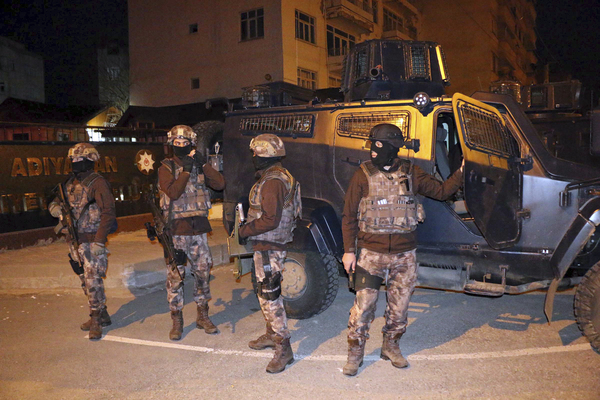 Iranian President Hassan Rouhani and Russian President Vladimir Putin at a press conference in Tehran in 2015. (Atta Kenare/AFP/Getty Images) Can Trump threaten another alliance? It's clear that the new administration views Iran as one of the United States' worst antagonists. President Trump himself said as much during an interview with Fox News' Bill O'Reilly that aired over the weekend, describing the Islamic Republic as "the number one terrorist state." That’s not a terribly controversial opinion in some Washington policy circles, most notably among neoconservative Republicans otherwise at odds with Trump's view of the world. But in the still-evolving world of Trumpian foreign policy, there's an obvious problem here: What about Russia? For Moscow, Tehran is still an important ally. In fact, as The Post's Liz Sly and Loveday Morris note in their story about the difficulties the Trump administration might face in isolating Iran, the conflict in Syria has brought the two countries closer. "Iran and Russia together have fought to ensure the survival of President Bashar al-Assad’s regime, and they are now pursuing a peace settlement in alliance with Turkey that excludes a role for the United States," Sly and Morris write. At the same time, Russia is a key supporter of the nuclear deal reached between Iran and a number of other nations under the previous administration. Both Moscow and Washington know this will be an issue. Asked about Trump's comments about Iran on Monday, Kremlin spokesman Dmitry Peskov told reporters that Russia did not agree with the idea that Iran exports terrorism. “It's no secret for anyone that Moscow and Washington hold diametrically opposed views on many international and regional policy issues," Peskov said, according to RT. A report in the Wall Street Journal suggests that the Trump team is trying to find a way around this. “If there’s a wedge to be driven between Russia and Iran, we’re willing to explore that,” an unnamed administration official told the Journal. That could be possible. The Tehran-Moscow alliance may well be more fragile than it seems. The two nations have a history of mistrust and there's little in the way of shared ideology pulling them together now. Many in the U.S. hope that Moscow would accept some friction with Iran in exchange for much-needed relief from sanctions imposed by Washington. But the White House and the Kremlin have sent mixed messages about their own relationship, too, suggesting both sides may be hedging their bets. — Adam Taylor  Turkish anti-terrorism police during an anti-ISIS operation in Adiyaman, southeastern Turkey, on Feb 5. (Mahir Alan/Dha-Depo Photos/AP) The big question Turkey announced on Monday it has arrested more than 800 people in a sweeping operation it says is targeting the Islamic State. It's a response to the growing cadence of terrorist attacks to hit Turkey recently, including a deadly shooting rampage on New Year's Eve. So we asked Kareem Fahim, the Post's Istanbul bureau chief: Does Turkey’s huge round-up of ISIS suspects mean it’s winning its war on terror? "Probably not. The massive sweep that took place over the last week — in 29 cities, the authorities said — is really Turkey’s first large-scale response to the growing indications that the Islamic State is singling out the country as a target. "The dangers were driven home a few weeks ago when a gunman massacred dozens of people in one of Istanbul’s most famous nightclubs. The Islamic State said it had ordered the attack in retaliation for a Turkish military offensive that began last summer and has targeted Islamic State militants in Syria. "We still don’t know much about who was arrested, or whether the sweep disrupted any plots that were in progress. It's worth noting that critics of Turkey’s government say this kind of crackdown was long overdue. For years, they say, the government turned a blind eye to foreign jihadists crossing from Turkey into Syria because Turkish officials were most concerned with toppling the Syrian government of President Bashar al-Assad. "Turkey’s government vigorously denies abetting the militants. In any case, its priorities have shifted. Turkey is now playing a leading role, along with Russia, in trying to broker a peace deal between Syria’s government and rebel groups. "And the tendency of Turkish officials to define the country’s war on terrorism broadly — as the fight against the Islamic State, Kurdish militant groups or even followers of an exiled cleric who carried out a failed coup last summer — seems to make it unlikely that the fight will come to a quick end." |